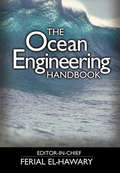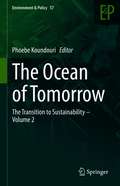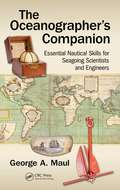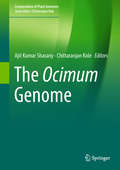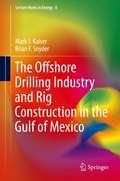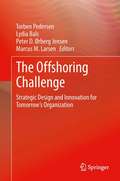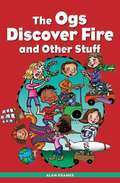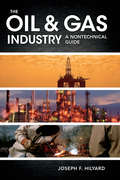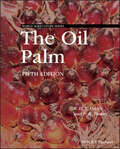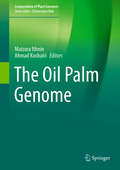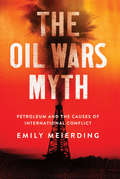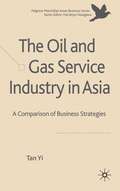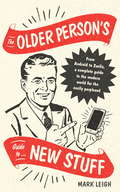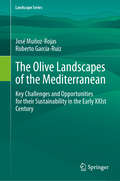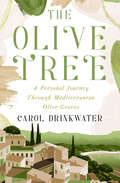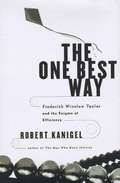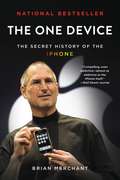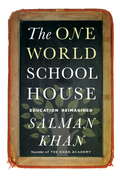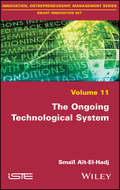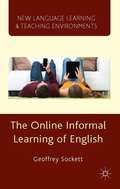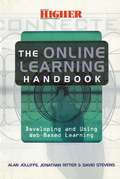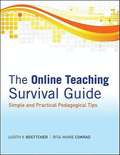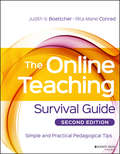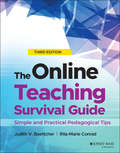- Table View
- List View
The Ocean Engineering Handbook
by Ferial El-HawaryCompiled by an internationally acclaimed panel of experts, this is the most complete reference of its kind. It provides comprehensive coverage of important areas of the theory and practice of oceanic/coastal engineering and technology. The well-organized text includes five major sections: Marine Hydrodynamics and Vehicles Control, Modeling Considerations, Position Control Systems for Offshore Vessels, Applications of Computational Intelligence in the Ocean's Environment, and Fiber Optics in Oceanographic Applications. Designed as a traditional handbook, it offers a detailed look ocean engineering, including thorough coverage of position control theory and implementation.
The Ocean of Tomorrow: The Transition to Sustainability – Volume 2 (Environment & Policy #57)
by Phoebe KoundouriAs a response to the climate crisis and its effect on marine ecosystems and coastal populations, this book proposes concrete science driven solutions at establishing transformation pathways towards Sustainable Blue Growth, that are supported by technically and socially innovative innovations. This book proposes investment options and management solutions that have the potential of making our seas and oceans resilient to crises- climate, financial, health- by laying the foundations for a green/blue, circular economy that is anchored in science driven solutions and geared toward public well-being. Now is the time to usher in systemic economic change and the good news is that we have our blueprint: it’s the combination of UN Agenda 2030 (17 SDG) and European Commission’s European Green Deal! There is no doubt that the Earth’s survival will depend on the protection and sustainable management of our seas and oceans and the resources they provide. This is recognized by the Joint Communication on International Ocean Governance, which is an integral part of the EU’s response to the United Nations’ 2030 Agenda for Sustainable Development, and in particular to the targets set out by Sustainable Development Goal 14 (SDG 14) to “conserve and sustainably use the oceans, seas and marine resources”. The analytical framework and science-driven concrete management solutions proposed in this book can accelerate the transition to a sustainable management of our seas and oceans, by turning the current challenges into opportunities for sustainable economic growth which is both environmentally resilient and leaves no one behind.
The Oceanographer's Companion: Essential Nautical Skills for Seagoing Scientists and Engineers
by George MaulScientists and engineers embarking on their first voyage for oceanographic or meteorological research are often unprepared for the experience. Going to sea involves learning a new language – that of the seaman. This is necessary for clear communications, for the safety and well-being of the members of the scientific party and the ship’s crew. The Oceanographer’s Companion is intended to familiarize a student with the basics of navigation, seamanship, marine engineering, communications, safety-of-life-at-sea, shiphandling, knots and splices, first aid, and so much more. The book will have a very practical feel with lots of examples.
The Ocimum Genome (Compendium of Plant Genomes)
by Chittaranjan Kole Ajit Kumar ShasanyThis book provides an overview of the Ocimum genus from its genetic diversity to genome sequences, metabolites and their therapeutic utilities. Tulasi, Ocimum tenuiflorum, as a member of the family Lamiaceae, is a sacred plant in India. The plants of this genus Ocimum are collectively referred to as Basil and holy basil is worshipped in the Hindu religion. Basils are reservoirs of diverse terpenoids, phenylpropanoids and flavonoids, in addition to commercially important aromatic essential oils. In 2016, two working groups in India published the genome sequence in two different genotypes of Ocimum tenuiflorum. To help the readers understand the complexities of the genus and different chemotypes, this book accumulates all the available information on this medicinal plant including the genome. The complete knowledge may enable researchers to generate specific chemotypes in basil either through conventional breeding or development of transgenic lines. It also makes it possible to investigate the medicinal nature of holy basil compared to different species of the same genus.
The Offshore Drilling Industry and Rig Construction in the Gulf of Mexico
by Mark J Kaiser Brian F SnyderJackups, semisubmersibles and drillships are the marine vessels used to drill offshore wells and are referred to collectively as mobile offshore drilling units (MODUs). MODUs are supplied through newbuild construction and operate throughout the world in highly competitive regional markets. The Offshore Drilling Industry and Rig Construction Market in the Gulf of Mexico examines the global MODU service and construction industry and describes the economic impacts of rig construction in the United States. The industrial organization and major players in the contract drilling and construction markets are described and categorized. Dayrates in the contract drilling market are evaluated and hypotheses regarding dayrate factors are tested. Models of contractor decision-making are developed, including a net-present value model of newbuilding investment and stacking decisions, and market capitalization models are derived. Jackup construction shipyards and processes are reviewed along with estimates of labor, equipment, and material cost in U.S. construction. Derivation of newbuild and replacement cost functions completes the treatise. The comprehensive and authoritative coverage of The Offshore Drilling Industry and Rig Construction Market in the Gulf of Mexico makes it an ideal reference for engineers, industry professionals, policy analysts, government regulators, academics and other readers wanting to learn more about this important and fascinating industry.
The Offshoring Challenge
by Torben Pedersen Lydia Bals Peter D. Ørberg Jensen Marcus M. LarsenThe continuous search for efficiency gains and the goal of attaining a sustainable competitive advantage have steadily increased the volume of goods and services procured globally from third party vendors. In this context, named as "the next wave of globalization", the offshoring phenomenon has stimulated research and political debates. With the rise of services offshoring, international value chain disaggregation for services has reached a formerly unknown scale. Also, it is increasingly complex transactions, requiring a higher degree of qualification, which are becoming subject to offshoring as well. The Offshoring Challenge: Strategic Design and Innovation for Tomorrow's Organization features selected chapters by an international research community on the topic of offshoring. All potential business models from offshore outsourcing to third party providers are covered, from cooperative arrangements to internal organizational set-ups including captive offshore centers. Contributions have significant insights regarding: the increasing offshoring of knowledge-intensive services; the offshoring process; business models incorporating offshoring; the hidden costs of offshoring; and the administration of offshoring activities within firms The book is aimed at a broad audience of scholars, students and practitioners in the fields of strategy, international business and operations management.
The Ogs Discover Fire and Other Stuff: Set of 6 (Navigators Ser.)
by Alison Adams Alan Kramer Anita DuFallaNIMAC-sourced textbook
The Oil & Gas Industry: A Nontechnical Guide
by Joseph HilyardJoseph Hilyard's timely new book provides a broad perspective on the oil and gas industry, with primary attention to the United States. It takes the reader on a tour of the operations used to find and evaluate resources, and then to produce, store and deliver oil and gas. The book's main focus is primarily on the equipment and processes used in exploring new resources; evaluating promising formations; drilling wells; managing oil and gas production; converting oil and gas into products; and transporting oil and gas. Separate chapters address the evolution and current structure of the petroleum industry; oil and gas trading; and challenges likely to face the oil and gas industry in coming years. Three appendices define key industry terminology; suggest further reading on selected topics; and identify organizations that can provide more information.
The Oil Palm (World Agriculture Series #1)
by R. H. Corley P. B. TinkerThe oil palm is the world's most valuable oil crop. Its production has increased over the decades, reaching 56 million tons in 2013, and it gives the highest yields per hectare of all oil crops. Remarkably, oil palm has remained profitable through periods of low prices. Demand for palm oil is also expanding, with the edible demand now complemented by added demand from biodiesel producers. The Oil Palm is the definitive reference work on this important crop. This fifth edition features new topics - including the conversion of palm oil to biodiesel, and discussions about the impacts of palm oil production on the environment and effects of climate change – alongside comprehensively revised chapters, with updated references throughout. The Oil Palm, Fifth Edition will be useful to researchers, plantation and mill managers who wish to understand the science underlying recommended practices. It is an indispensable reference for agriculture students and all those working in the oil palm industry worldwide.
The Oil Palm Genome (Compendium of Plant Genomes)
by Maizura Ithnin Ahmad KushairiThis book compiles the fundamental advances resulting from of oil-palm genome and transcriptome sequencing, and describes the challenges faced and strategies applied in sequencing, assembling and annotating oil palm genome sequences. The availability of genome and transcriptome data has made the mining of a high number of new molecular markers useful for genetic diversity as well as marker-trait association studies and the book presents high-throughput genotyping platforms, which allow the detection of QTL regions associated with interesting oil palm traits such as oil unsaturation and yield components using classical genetic and association mapping approaches. Lastly, it also presents the discovery of major genes governing economically important traits of the oil palm.Covering the history of oil palm expansion, classical and molecular cytogenetics, improvements based on wild and advanced genetic materials, and the science of oil palm breeding, the book is a valuable resource for scientists involved in plant genetic research.
The Oil Wars Myth: Petroleum and the Causes of International Conflict
by Emily MeierdingDo countries fight wars for oil? Given the resource's exceptional military and economic importance, most people assume that states will do anything to obtain it. Challenging this conventional wisdom, The Oil Wars Myth reveals that countries do not launch major conflicts to acquire petroleum resources. Emily Meierding argues that the costs of foreign invasion, territorial occupation, international retaliation, and damage to oil company relations deter even the most powerful countries from initiating "classic oil wars." Examining a century of interstate violence, she demonstrates that, at most, countries have engaged in mild sparring to advance their petroleum ambitions.The Oil Wars Myth elaborates on these findings by reassessing the presumed oil motives for many of the twentieth century's most prominent international conflicts: World War II, the two American Gulf wars, the Iran–Iraq War, the Falklands/Malvinas War, and the Chaco War. These case studies show that countries have consistently refrained from fighting for oil. Meierding also explains why oil war assumptions are so common, despite the lack of supporting evidence. Since classic oil wars exist at the intersection of need and greed—two popular explanations for resource grabs—they are unusually easy to believe in.The Oil Wars Myth will engage and inform anyone interested in oil, war, and the narratives that connect them.
The Oil and Gas Service Industry in Asia
by Tan YiThis book investigates the business strategies chosen by oil and gas service companies operating in China, Singapore and Malaysia. It provides an analytical view of the reliability of strategic theoretical frameworks based on Western business practice but applied in a non-Western business environment like Asia.
The Older Person's Guide to New Stuff: From Android to Zoella, a complete guide to the modern world for the easily perplexed
by Mark LeighSTRUGGLING TO STAY IN TOUCH WITH ELDERLY PARENTS DURING THE LOCKDOWN? WANTING TO HELP ISOLATED RELATIVES WITH ONLINE ORDERING? THIS IS THE PERFECT GUIDE FOR ANYONE GRAPPLING FOR THE FIRST TIME WITH FACETIME, GOOGLE HANGOUTS OR ANY OTHER ASPECT OF THE MODERN WORLD.A handy guide for anyone who says, 'The Facebook' or 'The Google' or who asks, 'Do they deliver emails on Sunday?' This is a book for the elderly and not-so-elderly who are bamboozled not just by the technology of the contemporary world, but also various modern concepts and conceits that the more youthful take for granted.It explains a host of modern concepts and technologies that have entered everyday use and parlance but which are alien (and possibly frightening) not just to the elderly - but probably also to anyone over 45. These concepts are universal and should therefore appeal to readers in the UK, Australia, US and Europe. The definitions are all real, but entertaining, making use of easy-to-understand 'real world' references or examples to explain them.
The Older Person's Guide to New Stuff: From Android to Zoella, a complete guide to the modern world for the easily perplexed
by Mark LeighSTRUGGLING TO STAY IN TOUCH WITH ELDERLY PARENTS DURING THE LOCKDOWN? WANTING TO HELP ISOLATED RELATIVES WITH ONLINE ORDERING? THIS IS THE PERFECT GUIDE FOR ANYONE GRAPPLING FOR THE FIRST TIME WITH FACETIME, GOOGLE HANGOUTS OR ANY OTHER ASPECT OF THE MODERN WORLD.A handy guide for anyone who says, 'The Facebook' or 'The Google' or who asks, 'Do they deliver emails on Sunday?' This is a book for the elderly and not-so-elderly who are bamboozled not just by the technology of the contemporary world, but also various modern concepts and conceits that the more youthful take for granted.It explains a host of modern concepts and technologies that have entered everyday use and parlance but which are alien (and possibly frightening) not just to the elderly - but probably also to anyone over 45. These concepts are universal and should therefore appeal to readers in the UK, Australia, US and Europe. The definitions are all real, but entertaining, making use of easy-to-understand 'real world' references or examples to explain them.
The Olive Landscapes of the Mediterranean: Key Challenges and Opportunities for their Sustainability in the Early XXIst Century (Landscape Series #36)
by José Muñoz-Rojas Roberto García-RuizThis book provides a state-of-the-art review of the current models and typologies of olive landscapes and related farming systems in the Mediterranean. It also explores potential prospects for monitoring and enhancing their sustainability standards. Olive groves are an essential component of the historical landscape that largely drive the cultural, ecological and socio-economic character of the region. Agronomic intensification and mechanization, market globalization and delocalization, and financialization are affecting these ancient farming systems in certain olive landscapes, whereas others are threatened by abandonment and financial loss. This complex set of processes is resulting in a heterogeneous mosaic of olive landscapes when examined across nested spatial-temporal scales and institutional levels. In alignment with such complexity, multiple challenges are arising linked to sustainability standards and targets. Sustainability has actually been the subject of much public discussion and yet of not nearly enough scientific evidence-gathering that is both robust and comparable across geographic contexts and scales. This is where this book is expected to provide a meaningful contribution. Ultimately, the main objective of this book is to establish a base-line sustainability picture of the complex mosaic of olive landscapes across the Mediterranean region. The book is structured along a series of national /regional and thematic reviews and syntheses, which lead to joined-up reflections on current and future challenges, opportunities and trajectories for enhancing the sustainability of olive landscapes across the Mediterranean. The book will be of interest to academics and researchers, policy-makers, the farming community, and market agents alike. We expect that they will find in this book an overall picture of the sector´s current situation and plausible pathways for achieving enhanced sustainability standards, whilst also permitting the reader to gain depth on the contingent characteristics of the different drivers, components and typologies of these dynamic and valuable landscapes.
The Olive Tree: A Personal Journey Through Mediterranean Olive Groves (The Olive Farm Series)
by Carol DrinkwaterAn olive farmer journeys through Spain, Italy, and North Africa to find the future of agriculture in an age of chemicals and climate challenges. Carol Drinkwater&’s beloved olive farm in the South of France was suffering badly from destructive pests and premature ripening. In a hunt for answers, she decided to set out on her own for a fact-finding tour of Spain, Italy, Morocco, and Algeria. In The Olive Tree, Carol recounts not only the agricultural education she gained during her travels, but the dangers she faced as terrorist bombs rocked one of her destinations and a group of beekeepers helped shepherd her through dangerous territory. Through it all, she confronts issues faced by farmers and non-farmers alike in today&’s world, from climate change to diminishing water reserves to the excessive use of chemicals. Ultimately, she will return to her land in Provence with a new appreciation for the urgency of these problems—and with an ingenious vision for the future shared with her by a brilliant group of olive growers . . .Praise for the Olive Farm series &“Vibrant, intoxicating and heartwarming.&” —Sunday Express &“Spellbinding . . . a must for anyone who dreams of moving to a kinder climate and starting a new life.&” —Choice
The One Best Way: Frederick Winslow Taylor and the Enigma of Efficiency
by Robert Kanigellandmark biography of Frederick Winslow Taylor--the man whose ceaseless quest for "the one best way"--changed the very texture of twentieth-century life. "In the past man has been first. In the future the System will be first." These are the words of Frederick Winslow Taylor, who in 1874, at the age of eighteen, abandoned his wealthy family's plans for him to attend Harvard and instead went to work as a lowly apprentice in a hot, dirty Philadelphia machine shop. As he rose through the ranks of management, he became the first efficiency expert, progenitor of all the stopwatch-clicking engineers who stalk the factories of the industrial world. Taylor's famous industrial philosophy--Scientific Management--influenced Ford's assembly line and Lenin's Soviet Russia. Management guru Peter Drucker has ranked him with Freud and Darwin as a maker of the modern world. The One Besf Way is the compelling story of this driven man-and a fascinating re-creation of the vanished era of steam and steel in which he lived and worked.
The One Device: The Secret History of the iPhone
by Brian Merchant"The One Device is a tour de force, with fast-paced edge and heaps of analytical insight." -Ashlee Vance, New York Times bestselling author of Elon Musk"A stunning book. You will never look at your iPhone the same way again." -Dan Lyons, New York Times bestselling author of DisruptedThe secret history of the invention that changed everything-and became the most profitable product in the world.Odds are that as you read this, an iPhone is within reach. But before Steve Jobs introduced us to "the one device," as he called it, a cell phone was merely what you used to make calls on the go.How did the iPhone transform our world and turn Apple into the most valuable company ever? Veteran technology journalist Brian Merchant reveals the inside story you won't hear from Cupertino-based on his exclusive interviews with the engineers, inventors, and developers who guided every stage of the iPhone's creation.This deep dive takes you from inside One Infinite Loop to 19th century France to WWII America, from the driest place on earth to a Kenyan pit of toxic e-waste, and even deep inside Shenzhen's notorious "suicide factories." It's a firsthand look at how the cutting-edge tech that makes the world work-touch screens, motion trackers, and even AI-made their way into our pockets.The One Device is a roadmap for design and engineering genius, an anthropology of the modern age, and an unprecedented view into one of the most secretive companies in history. This is the untold account, ten years in the making, of the device that changed everything.
The One World Schoolhouse: Education Reimagined
by Salman KhanA free, world-class education for anyone, anywhere: this is the goal of the Khan Academy, a passion project that grew from an ex-engineer and hedge funder's online tutoring sessions with his niece, who was struggling with algebra, into a worldwide phenomenon. Today millions of students, parents, and teachers use the Khan Academy's free videos and software, which have expanded to encompass nearly every conceivable subject; and Academy techniques are being employed with exciting results in a growing number of classrooms around the globe.Like many innovators, Khan rethinks existing assumptions and imagines what education could be if freed from them. And his core idea - liberating teachers from lecturing and state-mandated calendars and opening up class time for truly human interaction - has become his life's passion. Schools seek his advice about connecting to students in a digital age, and people of all ages and backgrounds flock to the site to utilise this fresh approach to learning.In THE ONE WORLD SCHOOLHOUSE, Khan presents his radical vision for the future of education, as well as his own remarkable story, for the first time. More than just a solution, THE ONE WORLD SCHOOLHOUSE serves as a call for free, universal, global education, and an explanation of how Khan's simple yet revolutionary thinking can help achieve this inspiring goal.
The Ongoing Technological System
by Smaïl Aït-El-HadjaitThe high level of innovation currently transforming our society and its technological dynamics can be seen as a second wave of innovation of the third technological system, which emerged in the late 1970s. This book discusses the concept of technological systems, focusing on the tools used for formalizing the organization of technology in society and its dynamics of evolution. The author uses these tools to characterize the contemporary technological system and to model its specific dynamics. In doing so, he raises questions about the continuity of the current technological system, and its capacity to generate powerful innovatory movements.
The Online Informal Learning of English
by Geoffrey SockettYoung people around the world are increasingly able to access English language media online for leisure purposes and interact with other users of English. This book examines the extent of these phenomena, their effect on language acquisition and their implications for the teaching of English in the 21st century.
The Online Learning Handbook: Developing and Using Web-based Learning
by David Stevens Alan Jolliffe Jonathan RitterA guide to developing Web-based learning materials. It provides advice, tools and techniques to help readers harness the potential of on-line methods of instruction and education. Taking a simple step-by-step approach, it proceeds from the basics through to operating computer-managed learning.
The Online Teaching Survival Guide
by Rita-Marie Conrad Judith V. BoettcherThe Online Teaching Survival Guide provides an overview of theory-based techniques for online teaching or for a technology-enhanced course, including course management, social presence, community building, and debriefing. Based on traditional pedagogical theory, this resource integrates the latest research in cognitive processing and learning outcomes. From a practical approach, this guidebook presents instructional strategies in a four-phase timeline, suitable for any online or blended course. Faculty with little knowledge of educational theory and those well-versed in pedagogy will find this book a key to developing their practical online teaching skills.
The Online Teaching Survival Guide: Simple and Practical Pedagogical Tips
by Rita-Marie Conrad Judith V. BoettcherEssential reading for online instructors, updated to cover new and emerging issues and technologies The Online Teaching Survival Guide provides a robust overview of theory-based techniques for teaching online or technology-enhanced courses. Covering all aspects of online teaching, this book reviews the latest research in cognitive processing and related learning outcomes while retaining a focus on the practical. A simple framework of instructional strategies mapped across a four-phase timeline provides a concrete starting point for both new online teachers and experienced teachers designing or revamping an online course. Essential technologies are explored in their basic and expanded forms, and traditional pedagogy serves as the foundation for tips and practices customized for online learning. The tips cover course management, social presence, community building, integration of new technologies, discussion and questioning techniques, assessment, and debriefing, along with new coverage of intensive or accelerated courses, customizing learning strategies, developing expertise, advanced course design, and assessment techniques exclusive to this new second edition. The theory and techniques of successful online teaching can be significantly different from those used face-to-face. With more and more classes being offered online, this book provides a valuable resource for taking your course to the next level. Understand the technology used in online teaching Learn specialized pedagogical tips and practices Examine new research on cognition and learning Adopt a clear framework of instructional strategies The explosion of online learning has created a demand for great online teachers. Increasingly, faculty who normally teach face-to-face are being asked to cover online courses—yet comprehensive pedagogical resources are scarce. The learning curve is huge, and faculty need a practical approach to course design and management that can be quickly and easily implemented. The Online Teaching Survival Guide provides that essential resource, with a customizable framework and deeper exploration of effective online teaching.
The Online Teaching Survival Guide: Simple and Practical Pedagogical Tips
by Rita-Marie Conrad Judith V. BoettcherA timely update to the best-selling, practical, and comprehensive guide to online teaching The Online Teaching Survival Guide provides a robust overview of theory-based techniques for teaching online or technology-enhanced courses. This Third Edition is a practical resource for educators learning to navigate the online teaching sector. It presents a framework of simple, research-grounded instructional strategies that work for any online or blended course. This new edition is enhanced with hints on integrating problem-solving strategies, assessment strategies, student independence, collaboration, synchronous strategies, and building metacognitive skills. This book also reviews the latest research in cognitive processing and related learning outcomes. New and experienced online teachers alike will appreciate this book’s exploration of essential technologies, course management techniques, social presence, community building, discussion and questioning techniques, assessment, debriefing, and more. With more and more classes being offered online, this book provides a valuable resource for taking your course to the next level. Understand the technology used in online teaching and discover how you can make the most of advanced features in the tech you use Learn specialized pedagogical tips and practices that will make the shift to online teaching smoother for you and your students Examine new research on cognition and learning, and see how you can apply these research findings your day-to-day Adopt a clear framework of instructional strategies that will work in any online or blended setting Learn how to make the most of your synchronous online class meetings using flipped model techniques integrated with asynchronous conversation Recently, schools across the globe have experienced a shift to online courses and teaching. The theories and techniques of synchronous virtual online teaching are vastly different from traditional educational pedagogy. You can overcome the learning curve with this theory-based, hands-on guide.
